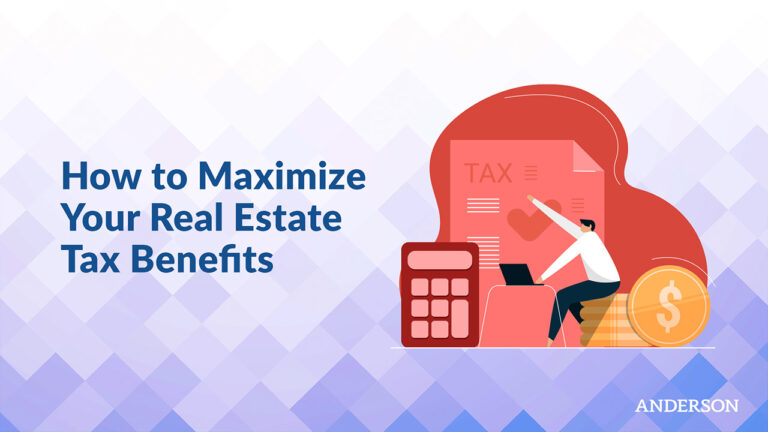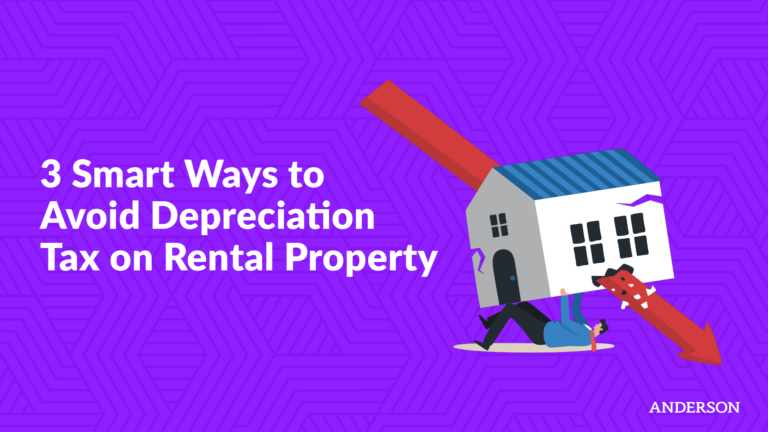
Real estate is one of many ways to invest, create passive income, and grow your net worth. With real estate investment comes a suite of options for tax benefits and deductions, but understanding complex tax rules can be difficult, even for the most seasoned real estate investors. By learning about the rules and the deductions and credits at your disposal, you can lower your tax liability and make real estate investing as lucrative as possible.
As tax season comes into full swing, you might be starting your tax planning process. Here’s everything you need to know about maximizing your real estate tax benefits.
What Are Real Estate Tax Benefits?
Real estate tax benefits are deductions and credits you can take advantage of to reduce your tax liability if you own real estate. These are the types of tax benefits you might qualify for if you own, invest in, or operate real estate:
- Pass-through deductions.
- Capital gains.
- Depreciation.
- 1031 exchange.
- FICA tax.
- Tax-deferred retirement accounts.
Key Takeaways
- Real estate tax benefits can help you lower your overall tax liability.
- You can use tax benefits for rental properties, second homes, and home offices.
- Some real estate benefits include depreciation and tax-deferred retirement.
Tax & Asset Protection Workshop
Learn about Real Estate & Asset Protection at our next
FREE LIVE STREAM
Importance of Real Estate Tax Benefits
When you invest in real estate, you can write off expenses related to the ownership, operation, and maintenance of your properties. These are some expenses that might qualify for tax write-offs:
- Property taxes.
- Management fees.
- Insurance.
- Maintenance costs.
- Interest on a mortgage.
Maximizing Your Real Estate Tax Benefits
Here’s what you need to know about maximizing your real estate tax benefits:
Understanding the Tax Rules for Real Estate
As you prepare your taxes, it’s important to understand the tax rules for the properties you own. Speaking with a CPA or trusted accountant during this process can be very helpful, especially if you’re not familiar with tax laws and how they’ve changed over the past year. Seasoned accountants and real estate experts can help you get the most and pay the least when it comes to your taxes. These are some types of taxes you might pay if you own real estate:
- Capital gains taxes. These are taxes you pay when you make a profit from selling your property. You only pay capital gains taxes on the profit, not the entire sale amount of the property.
- Property taxes. These are taxes the government collects to improve the neighborhood. Property taxes can go to schools, infrastructure, and emergency services.
Investing in a Rental Property
Rental properties can be great opportunities for generating passive income. If you’re investing in a rental property, the methods you can use to lower your tax liability include:
- Participating in a housing program for seniors, veterans, and people with disabilities.
- Having your property reassessed to ensure it’s valued correctly.
- Paying your tax bill early to take advantage of local tax deductions.
Investing in a Second Home
Having a second home can be beneficial for several reasons. It can provide you with a place to stay when you travel, increase your net worth, and diversify your investment strategy. Even if a home is not your primary place of residence, you still pay real estate taxes. Here are a few ways you can reduce your tax liability for a second home:
- Deduct up to $5,000 if married filing separately or $10,000 if filing jointly for property taxes.
- Have your property reassessed to ensure it’s valued correctly.
- Deduct the interest you paid for your mortgage for a second home.
Using the Home Office Deduction
If you’re a small business owner, you can take advantage of the home office deduction. This is calculated on Form 8829 and allows you to deduct mortgage interest, utilities, maintenance, depreciation, repairs, and insurance costs from your overall tax liability. Generally, you must have an established home office that you use to conduct business on a regular basis, and it must be within your primary place of residence.
Taking Advantage of Capital Gains Exclusions
You can take advantage of certain capital gains exclusions to lower your tax liability. Capital gains refers to the profit you make from selling a home. For example, if you purchase a home for $200,000 and sell it for $250,000 three years later, your capital gains are $50,000. Fortunately, you can minimize the amount of taxes you pay on that sum. For example, you can avoid paying taxes on some of the gains if you sell your home for the following reasons:
- Medical expenses or health problems.
- Career change or relocation.
- Death in the family.
- Divorce or other separation.
- Natural disaster.
To qualify for a capital gains exclusion, you must meet requirements such as:
- Residing in the house for at least two of the previous five years.
- Living in the house as your primary residence.
- Owning the house for two of the last five years.

Real Estate Tax Benefits Summary
Nobody wants to pay taxes on their real estate investments or home but, fortunately, you can take advantage of several benefits to minimize the amount you pay. This can help investors see more return on their money and can help homeowners retain that cash for something more useful, including other bills, home improvements, or personal expenses. From capital gains exclusions to home office tax benefits, you might lower your tax liability through a number of avenues.
Tax codes can be confusing and overcomplicated, but working with a professional can help you navigate the process more easily. If you want to learn how to optimize your tax savings, you can work with one of our Anderson Business Advisors during a free 45-minute strategy session. During this time, we’ll help you create an asset protection blueprint and connect you with our trusted tax professionals.
Tax Rules Won’t Wait
Taxes can be complicated and tedious to complete, but it’s important to understand the tax rules associated with your investments. Even a basic understanding can help you create your business plan and understand which deductions are available to you. If you want to maximize your profits, real estate investment planning is vital.
We hope this guide has been helpful if you want to optimize your tax benefits this year. Real estate investing can be a great way to increase your net worth and earn passive income, and maximizing your tax benefits can help you only pay what you owe. To learn more about the tax planning process, try out one of our tax-wise workshops today.
Free Strategy Session with an Anderson Advisor
Receive a detailed risk assessment to assist in lowering problem areas that could wipe out all of your assets with one wrong move. Speak with an Anderson Professional Advisor to get your FREE Strategy Session.
Limited-Time Offer: ($750 value.)











